30 March 2008
Life, death, and the blog
I spoke to the BC Branch of the Editors' Association of Canada a week and a half ago, about how I've integrated my online and offline lives since getting cancer last year. I've now posted an enhanced audio podcast of my talk, which includes my slides as part of the MPEG-4 file(24 MB, about 1 hour).
If you're subscribed to my podcast feed, you may already have the file on your computer or iPod.
If you're subscribed to my podcast feed, you may already have the file on your computer or iPod.
29 March 2008
Gnomedex and Twitter
It looks like Chris Pirillo's Gnomedex conference will take place at the end of August in Seattle again this year (the best time of year in this part of the world). I hope to be able to go—I participated but could not attend in 2007. Chris makes an interesting point in his post about how:
Chris, Ponzi, Stuart, and crew are surely thinking of new ways to run the show in 2008. We'll see what that brings.
Positive or negative, Twitter fuels groupthink. [...] Handling 350+ special interest groups simultaneously when they have a direct line to the rest of the world is a completely new challenge.Gnomedex is an unusual tech conference. It's smaller and less expensive than most, more broad-ranging, yet it attracts a more hard-core techie crowd than, say, Northern Voice here in Vancouver. Gnomedex has a different vibe every year, driven by whatever currents are pushing the web community at the time. Despite my absence last summer, I felt something a little off in 2007 from reports—perhaps in part because of a disconnect between that Twitter groupthink and the structure of the meeting.
Chris, Ponzi, Stuart, and crew are surely thinking of new ways to run the show in 2008. We'll see what that brings.
28 March 2008
Dubious milestones
 It took almost six months (or a year, if you count my previous treatments), but I finally hit one of those chemotherapy milestones everybody talks about.
It took almost six months (or a year, if you count my previous treatments), but I finally hit one of those chemotherapy milestones everybody talks about.Yesterday I had my 12th of what are so far supposed to be 16 treatments since last October. Then, last night, I barfed up my dinner. It's not the first time I've thrown up since beginning cancer treatment, but it was the first time caused by the chemo.
While overall, my side effects haven't been as bad as I might have expected, chemo does feel something like a slow, slow piledriver. Every couple of weeks, I get hammered down. And while my recovery time is pretty quick, each blow pushes me a bit further down. I finally decided to shave my head, for instance, because my hair was just shedding too much.
But, you know, my wife is making butter chicken for dinner, plus cupcakes for her and the kids. And today, I don't feel like I'm going to barf up anything at all. That's progress.
26 March 2008
The real stakes of a U.S. election
 I've just finished watching the full online version of the first part of "Bush's War" (via Kottke), an extraordinary PBS Frontlinedocumentary about the tactical battles and infighting within the U.S. federal administration between September 11, 2001 and the initial invasion of Iraq on March 20, 2003.
I've just finished watching the full online version of the first part of "Bush's War" (via Kottke), an extraordinary PBS Frontlinedocumentary about the tactical battles and infighting within the U.S. federal administration between September 11, 2001 and the initial invasion of Iraq on March 20, 2003.It is a multi-hour program, extraordinarily depressing, though not surprising. The sinking feeling I had back in 2002—as I slowly lost the belief that there were good intentions somewhere, anywhere in the call to war—comes seeping back as I watch it.
I recommend you watch "Bush's War." (I plan to check out the second part tomorrow.) It is election season in the U.S. again, and it's worth some time for all of us, inside and outside America, to remember what the real stakes of voting in that country are.
My least favourite part of town
 There are some pretty views from the Fairviewneighbourhood of Vancouver, but it is now officially my least favourite part of the city. It's objectively far nicer than many other parts of this region, but that doesn't matter.
There are some pretty views from the Fairviewneighbourhood of Vancouver, but it is now officially my least favourite part of the city. It's objectively far nicer than many other parts of this region, but that doesn't matter.Part of my dislike comes from a job I had there back in the '90s. There was no backbreaking physical work or relentless tedium (I encountered those in earlier jobs, installing alarms and working night shift at a gas station, respectively), but it was still the worst position I've ever held, because the psychological environment of the place was positively poisonous. I would take the longest lunch hours I could, sometimes walking down to False Creek and sitting on a grassy knoll, just staring into the distance eating while trying to purge the stress from my system.
I quit after nine months, during which numerous coworkers had come and gone, some quitting after one day and others (including the person who hired me, who'd been with the company since it was founded) being summarily fired for often arbitrary reasons. I'm amazed I stayed so long.
But that's not the main reason. It's because Fairview is also home to the B.C. Cancer Agency, where I spend far too much time these days. Counterintuitively, the people there, from volunteers to doctors to nurses to technicians, are overwhelmingly wonderful, friendly, helpful, and understanding. The building is nicely decorated for a medical facility. It runs like clockwork—I've never had so many appointments with such complex interrelationships run so smoothly and on time, or been apologized to so profusely when things run late or get postponed.
And yet, it is the Cancer Agency, where I have gone for CT scans and radiation treatments and chemotherapy and emergency prescriptions of blood thinner injections. It's where my doctors told me that my cancer had spread to my lungs. True, Fairview is not where I spent the worst days of my life, late last July when I had lost 50 pounds, was hooked up to two IV poles in a ward at St. Paul's hospital, and could only lie in bed—not bathe, walk, eat, or even drink—for several days.
Yet somehow Vancouver's downtown West End, where those worst days did happen, still holds too many other happy memories, of fireworks and new love with my wife, and childhood walks in the park with my grandmother. Fairview is where I'm reminded, all the time, of how broken my body still is. Even driving through it on my way elsewhere, I feel queasy, my subconscious focusing on the nauseating chemical soup of chemo I get there every two weeks. Tomorrow is the next infusion.
Sorry, Fairview. I can't help it. You suck.
24 March 2008
Pecker
 According to the provincial government, there are 12 species of woodpecker that appear at least occasionally in British Columbia, but only a few are common in the southern coastal areas outside the summer months. The one I've noticed most often is the pileated woodpecker, with its distinctive red swooshy head.
According to the provincial government, there are 12 species of woodpecker that appear at least occasionally in British Columbia, but only a few are common in the southern coastal areas outside the summer months. The one I've noticed most often is the pileated woodpecker, with its distinctive red swooshy head.Right now, one of these guys is being a real goddamned pecker around our house.
UPDATE: I think I have unfairly maligned the pileated woodpecker. Although I still haven't spotted it directly, numerous reports from my readers and more careful listening to the infernal tapping tells me that our woodpecker is more likely to be a Northern flicker (I've updated the accompanying photo accordingly). In any case, a suggestion to burn some paper under our stove hood when we hear the tapping, so smoke sends the bird away, may be working. We'll see.
You see, it has decided that the metal chimney above our stove is an ideal target. I don't know why: if I were a woodpecker, I'd probably figure out fairly quickly that there aren't any tasty grubs living inside a kitchen vent. Then again, woodpecker skulls have evolved largely to withstand massive repeated impacts, not for smarts.Now, imagine what it sounds like at, say 7:18 a.m. on Easter Monday, to have a woodpecker pounding away, Kalashnikov-like, on a highly-reverberant tube of metal that leads directly from the roof of your house into the amplifying stove hood in the middle of your kitchen, which is in the centre of the structure, right across the hall from the bedrooms. This has been going on intermittently for two or three weeks now at our place.
I stumbled out of bed and turned on the stove vent fan (which is very loud, being older than I am). No dice. So I wandered outside in bathrobe and bare feet and hucked a couple of small stones from our yard in the general direction of that part of the roof. I was surprised at my accuracy at such a bleary-eyed time of the morning.
There were some clattering noises, and I think I scared it off for now. It's likely pileated—the largest surviving woodpecker variety in North America, by the way—from the sound of its drumming, but I haven't actually seen it yet. I suppose if it persists in trying to find an insect colony in our kitchen chimney, it will eventually starve to death, but maybe it's clever enough to be working on some nearby trees too. I hope it avoids punching a bunch of holes in the aluminum, anyway, and that it gets the point (ha ha) eventually and moves on. Or I'll have to get better aim.
23 March 2008
Show off your geekiest photo
For no particular reason, I recently created a Flickr photo group called Your Geekiest Photo, and added mine, from 1985:
If you have a dark, dark nerdy picture in your past and don't mind revealing it to the world, I'd appreciate if you joined the group and added it. If you're not already a member of Flickr, you can sign up for free.
If you have a dark, dark nerdy picture in your past and don't mind revealing it to the world, I'd appreciate if you joined the group and added it. If you're not already a member of Flickr, you can sign up for free.
21 March 2008
Some people have bad ideas
I like to give people the benefit of the doubt, but sometimes they squander it. A couple of examples.
A few months ago, I gave a bit of a mixed review to Why Beautiful People Have More Daughters, a book about evolutionary psychology. It turns out that the main author, Satoshi Kanazawa, has taken his ideas to at least one ridiculous and terrifying extreme:
That's straight-on crazy talk (not to mention almost certainly incorrect in its results). Doesn't raise my opinion of his book, that's for sure.
On the other side of the evolutionary aisle are the producers of Expelled, a documentary claiming that the academic and scientific establishment are unfairly quashing free speech, by shunning researchers who promote intelligent design/creationism and other "critiques" of evolutionary biology. The movie is hosted by Ben Stein (probably best known as the teacher who said, "Bueller? Bueller?"), and also apparently argues that accepting evolution leads inevitably to atheism, which then (get this) led to the Stalinist pogroms and the Holocaust.
Uh, okay.
Among those interviewed in the film is PZ Myers, an American biology professor. He is also almost as well-known an atheist and staunch critic of religion and creationism as Richard Dawkins. He says that the producers were dishonest when asking him to appear in Expelled, claiming that its working title was Crossroads (although the expelledthemovie.com domain had apparently already been registered) and that it was a more objective examination of science and religion, rather than a project advocating for creationism. He has been scathingly critical of the film ever since.
Myers's interview ended up in the film anyway, which has been pre-screened a few times in the U.S. for largely hand-picked evangelical Christian audiences. One of those screenings just occurred in Minnesota, where Myers happened to be, so he signed up on the website for tickets for him, his family, and some friends. But when he showed up, the film's producer, who was also present and helped to organize the screening, barred him from entering.
His family and friends got in. One of those friends, also someone interviewed for the film under false pretenses?
Richard Dawkins. Yes, that one. No, really.
It's not turning into a good PR move for the movie's producers.
A few months ago, I gave a bit of a mixed review to Why Beautiful People Have More Daughters, a book about evolutionary psychology. It turns out that the main author, Satoshi Kanazawa, has taken his ideas to at least one ridiculous and terrifying extreme:
Imagine that, on September 11, 2001, when the Twin Towers came down, the President of the United States was not George W. Bush, but Ann Coulter. What would have happened then? On September 12, President Coulter would have ordered the US military forces to drop 35 nuclear bombs throughout the Middle East, killing all of our actual and potential enemy combatants, and their wives and children. On September 13, the war would have been over and won, without a single American life lost.Uh, okay.
Yes, we need a woman in the White House, but not the one who’s running.
That's straight-on crazy talk (not to mention almost certainly incorrect in its results). Doesn't raise my opinion of his book, that's for sure.
On the other side of the evolutionary aisle are the producers of Expelled, a documentary claiming that the academic and scientific establishment are unfairly quashing free speech, by shunning researchers who promote intelligent design/creationism and other "critiques" of evolutionary biology. The movie is hosted by Ben Stein (probably best known as the teacher who said, "Bueller? Bueller?"), and also apparently argues that accepting evolution leads inevitably to atheism, which then (get this) led to the Stalinist pogroms and the Holocaust.
Uh, okay.
Among those interviewed in the film is PZ Myers, an American biology professor. He is also almost as well-known an atheist and staunch critic of religion and creationism as Richard Dawkins. He says that the producers were dishonest when asking him to appear in Expelled, claiming that its working title was Crossroads (although the expelledthemovie.com domain had apparently already been registered) and that it was a more objective examination of science and religion, rather than a project advocating for creationism. He has been scathingly critical of the film ever since.
Myers's interview ended up in the film anyway, which has been pre-screened a few times in the U.S. for largely hand-picked evangelical Christian audiences. One of those screenings just occurred in Minnesota, where Myers happened to be, so he signed up on the website for tickets for him, his family, and some friends. But when he showed up, the film's producer, who was also present and helped to organize the screening, barred him from entering.
His family and friends got in. One of those friends, also someone interviewed for the film under false pretenses?
Richard Dawkins. Yes, that one. No, really.
It's not turning into a good PR move for the movie's producers.
Labels: biology, controversy, creationism, intelligentdesign, movie, naturalselection, religion, science
20 March 2008
No-hair club for men
Alright, I finally did it. Off we went to the mall and I shaved my hair off!


 The chemo wasn't making me completely bald by itself—but it was thinning and greying my hair significantly. The manginess and relentless shedding of my hair (in the shower and on our pillows especially) was getting really, really annoying. Plus, it's as good a chance as any for me to shave my head, which I've never done in my life. Here's a nice set of contrasting pictures:
The chemo wasn't making me completely bald by itself—but it was thinning and greying my hair significantly. The manginess and relentless shedding of my hair (in the shower and on our pillows especially) was getting really, really annoying. Plus, it's as good a chance as any for me to shave my head, which I've never done in my life. Here's a nice set of contrasting pictures:
I like it! And I look more like my podcast co-host Paul now (or maybe Yul Brynner) too. Your thoughts?



I like it! And I look more like my podcast co-host Paul now (or maybe Yul Brynner) too. Your thoughts?
A billion years, or 600 million, give or take
 A friend of asked me today:
A friend of asked me today:How does evolution explain something like DNA and how it's decoded? Natural selection/chance-change over billions of years doesnt seem adequate to explain it. Are there other evolutionary mechanisms that might explain it?Now, beware, since IANAEBOP (I Am Not An Evolutionary Biologist Or Philosopher). I do have pretty decent background in biology generally, it being my degree and all, and that means I need to understand natural selection well. So here goes my take.
Also, DNA seems very clearly to be instructions/information. From an evolutionary standpoint, would that be an illusion because [we humans interpret] what turns out to be chance results as something more meaningful and organized because the result kind of works?
What's chance, what isn't?
One of the issues here is that too often people talk about natural selection, including the initial appearance of DNA, as a random process. It's actually much the opposite: yes, mutations (i.e. the source material or "seeds" for evolutionary change) occur randomly, but the ones that persist because they lead to greater reproductive success are completely non-random. Non-random rules arising from natural processes filter out almost all the random stuff, leading to evolutionary processes that build upon themselves to generate new things.But non-randomness doesn't have to imply conscious agency (at least I don't think so). Nor does it imply inevitability, or even directionality, really. If you rolled back the clock and started things over again with the first simple microorganisms, or at any later stage, even with essentially the same conditions, the result might very well have turned out very differently.
Evolution is a historical process, and like human history, there are so many inter-related, contingent influences going on that if we, say, started over again 75 million years ago with dinosaurs, even if an asteroid still wiped them out, there's no guarantee a human-like intelligence would arise later. Or if it did, that primates would necessarily be what did it.
Similarly, roll back farther, and would insects end up as the dominant multicellular animals again? Might woody flowering plants once more come to dominate over ferns and other now less common forms? Maybe not.
You can think of an analogy in something like the pattern of a streambed. Yes, the movement of individual water molecules or sand grains may be essentially random, but gravity and friction and a variety of other simple laws of nature, interacting in a very complex way, make it so that the result—the tree-like form of a drainage basin—has a very non-random structure. (If you drop something on earth, it falls down. If things were random, you'd have no way to predict which direction it would go.)
But, yet again, if you rolled back the clock and started the erosion process all over again, the stream's course might run in a very different direction. There would still be a tree-like structure constrained by natural laws, but the details of it would be totally different, so you couldn't plan to build a house or waterwheel or hydro dam in a particular location in advance.
The vastness of time
Another issue is time. Our brains really aren't well equipped to handle the kinds of time scales this stuff happens on. Something like DNA seems irredeemably complicated to have arisen by the hit-and-miss processes we're talking about. It's too well built. (Of course, the process also has its flaws, which is why people like me get cancer.) But we're used to watching stuff happen over the course of minutes or hours or days or weeks or months or years or maybe decades. The rise and fall of civilizations may take centuries. To us that seems like a long time.Evidence seems to indicate that DNA first appeared pretty early on in earth's history. But it still took something like 600 million years, or maybe closer to a billion. Even if it werecompletely random (rather than a rule-driven process with random "seeds"), a lot of amazing things could happen totally by chance in 600 million years. And a lot of amazing things have happened in the 4 billion years since, some random, some not.
Humans have never witnessed a large asteroid impact on earth. As far as our actual experience (even on an evolutionary time scale) is concerned, it has never happened. But given enough time, tens or hundreds of millions of years, it pretty much must happen again, and it has happened several times before. So we can consider things impossible when, in the long run, they are inevitable, or at least probable.
Would DNA, or something like it, inevitably have arisen on earth, given enough time? We don't know, and can't know yet. That's why looking for unrelated life elsewhere is important: even if it's non-intelligent life, finding something that arose separately from life on earth would tell us that life-driving processes are at least reasonably likely in this universe.
Or maybe it really is nearly (but not quite) impossible, and it only happened here, once in all these billions of years there have been stars and planets. I hope not, but it could be.
Saving a step
Now, if you step back and ask why natural laws are structured in such a way that contingent, historical evolution can happen even once (or even why atoms and molecules can form at all in the first place, rather than just creating a universe that's nothing but a soup of plasma), that enters into realms of philosophy that I don't think we may ever be able to answer.Many will answer that God must have made those rules. But if I think like that, I always have to ask: then what made the God (or gods) that could make those rules, and by what meta-rules? In my mind, it's the same problem, just one step further, so it isn't really an answer at all.
I'm comfortable enough thinking that life and the DNA that lets it propagate "just happened" (perhaps the greatest oversimplification it would ever be possible to make in any circumstance). And with observation and intelligence, we're able to understand very much about how things have happened since, without having to resort to supernatural explanations that, by definition, we cannot analyze because their rules must be inscrutable to us.
18 March 2008
Farewell to Sir Arthur
While I have to admit that his fiction was sometimes a bit wooden, Sir Arthur C. Clarke, who died today, was one of the true visionaries of the last century. Geostationary telecommunications satellites—the ones we all use now for all sorts of things—were his idea. He helped with the deployment of radar in World War II. And in novels like Rendezvous With Rama and Childhood's End, he imagined how humans might react if we find out we aren't alone in the universe.
In many ways, he helped build the frame around our modern ideas about astronomy, cosmology, and space travel. He was no doubt disappointed that we didn't pursue the kind of space program started in the 1950s and '60s. We're certainly far from the routine orbital and lunar trips he and Stanley Kubrick forecasted in 2001.
He was, in many ways, an eccentric, married only once, briefly, decades ago, and spending the last 50 years of his life in Sri Lanka after leaving his native Britain. He was also a master of pithy quotes: "Any sufficiently advanced technology is indistinguishable from magic." "If there are any gods whose chief concern is man, they cannot be very important gods." "Any teacher that can be replaced by a machine should be!" "There is hopeful symbolism in the fact that flags do not wave in a vacuum." "I don't believe in astrology; I'm a Sagittarian and we're sceptical."
I read a lot of his stuff when I was young, and he is one reason I turned into a geek and a science major. He lived a long life, to 90, but it's still a sad day that he's gone.
In many ways, he helped build the frame around our modern ideas about astronomy, cosmology, and space travel. He was no doubt disappointed that we didn't pursue the kind of space program started in the 1950s and '60s. We're certainly far from the routine orbital and lunar trips he and Stanley Kubrick forecasted in 2001.
He was, in many ways, an eccentric, married only once, briefly, decades ago, and spending the last 50 years of his life in Sri Lanka after leaving his native Britain. He was also a master of pithy quotes: "Any sufficiently advanced technology is indistinguishable from magic." "If there are any gods whose chief concern is man, they cannot be very important gods." "Any teacher that can be replaced by a machine should be!" "There is hopeful symbolism in the fact that flags do not wave in a vacuum." "I don't believe in astrology; I'm a Sagittarian and we're sceptical."
I read a lot of his stuff when I was young, and he is one reason I turned into a geek and a science major. He lived a long life, to 90, but it's still a sad day that he's gone.
16 March 2008
Learn home recording at IHR TV
 My Inside Home Recording podcast co-host Paul has been making instructional videos for macProVideo.com for some time now, and he's good at it. So when he proposed that we start putting out short video podcasts in addition to our regular audio show, I knew they could be useful.
My Inside Home Recording podcast co-host Paul has been making instructional videos for macProVideo.com for some time now, and he's good at it. So when he proposed that we start putting out short video podcasts in addition to our regular audio show, I knew they could be useful.Now we've posted our first episode of Inside Home Recording TV (IHR TV). This one Paul recorded entirely himself. It's about using Propellerhead's ReWire to link their Reason software to Apple's Logic Pro.
We're trying something new with this video podcast. As usual, you can subscribe to watch on your computer, Apple TV, iPod, Zune, or whatever. In addition to posting it on our own site, you can also find each episode free at the video sharing sites Revver, Vimeo, Blip.tv, and YouTube. Plus we post them to Facebook, and will note each new show (audio and video) at Twitter.
Wacky wireless
I'm posting this from my iPod Touch on a bench at the playground at my kids' school. They are riding bikes. Yay for free open Wi-Fi from one of the nearby apartments.
15 March 2008
Links of interest for the Ides of March (2008-03-15):
- I mentioned the other Derek Miller before. Looks like he's going to get even more famous—his latest album is a collaboration with Double Trouble and Willie Nelson. So when you see "Derek Miller with Willie Nelson," it's really not me.
- I didn't know that the Milky Way, in which we live, is a barred spiral galaxy.
- User interface design, simplified.
- "That's not the same." "Yes it is."
- I love the existentialism of Garfield Minus Garfield.
- The 20 biggest record company screw-ups of all time.
- Podcasting statistics, explained.
- Check out the iPod on the Space Shuttle. (They had to put in a different battery for safety, by the way.)
- From Stuff White People Like: "[Going to graduate school] is an opportunity to join an elite group of people who have a passion for learning that is so great they are willing to forgo low five-figure publishing and media jobs to follow their dreams of academic glory."
14 March 2008
Probability, the Fab Four, and my kids
As always, there are some people who think those darned kids today are taking us all to hell in a handbasket with their ignorance and filthy habits. However, I seem to recall titles like thisonly in my university statistics course textbook:
But that's not where it comes from. It's a school math worksheet for my younger daughter, who is eight and in grade two. I'm not sure "data management and probability" were words I could even say at that age. (Then again, I did know what "carbon monoxide" was from my first favourite book.)
As for my other daughter, who is ten, she drew a picture the other day. It's taped to her bedroom door:
I liked the Beatles at that age too, but she loves them. I had no idea who the individual Beatles were, never mind what instruments they played—especially that Paul played piano as well as bass.
Notice that while John and George are playing their guitars left-handed, which isn't correct, Ringo's drums are frighteningly accurate. And even though his kit didn't have one, hers has a soundhole in the front drum head as most do these days. I guess my work as a drummer has rubbed off a bit.
Kids today. Too damned smart.
But that's not where it comes from. It's a school math worksheet for my younger daughter, who is eight and in grade two. I'm not sure "data management and probability" were words I could even say at that age. (Then again, I did know what "carbon monoxide" was from my first favourite book.)
As for my other daughter, who is ten, she drew a picture the other day. It's taped to her bedroom door:
I liked the Beatles at that age too, but she loves them. I had no idea who the individual Beatles were, never mind what instruments they played—especially that Paul played piano as well as bass.
Notice that while John and George are playing their guitars left-handed, which isn't correct, Ringo's drums are frighteningly accurate. And even though his kit didn't have one, hers has a soundhole in the front drum head as most do these days. I guess my work as a drummer has rubbed off a bit.
Kids today. Too damned smart.
13 March 2008
Chemotherapy will last longer than I expected
 I thought that yesterday's chemo treatment (which continues, with a bottle I'm hooked up to right now at home, till tomorrow) would be my second last for now. But it won't be. My oncologist Dr. Kennecke recommended yesterday that I take at least four more treatments, totaling 16 since I started in October, then perhaps move on to a different mix of drugs.
I thought that yesterday's chemo treatment (which continues, with a bottle I'm hooked up to right now at home, till tomorrow) would be my second last for now. But it won't be. My oncologist Dr. Kennecke recommended yesterday that I take at least four more treatments, totaling 16 since I started in October, then perhaps move on to a different mix of drugs.That's disappointing, though not a complete surprise. As I mentioned, my last CT scan was good, in that the blood clot in my lung is gone and the small metastatic tumours there have not grown. But that's the thing: the chemo is keeping them at bay. Taking a break as I was hoping to—in order to recover a little and have the surgery that can reconnect my intestines together (so I can poo normally, rather than into a bag glued to the side of my belly)—might risk letting the cancer grow.
And, reasonably enough, I don't want that.
So I've had to readjust my thoughts for this year. When will I be able to start work again, even part-time and from home? I don't know. Will we travel as a family this summer? Likely, but probably not far. Will the chemo keep working, and maybe shrink the tumours eventually? I sure the hell hope so.
I had hoped that the limbo I've been living in during the last five months of chemo—a somewhat sisyphean routine of three days of crappy, foul, vile side effects interrupting two weeks of feeling relatively normal while my hair thins and goes rapidly grey, my fingers get strangely discoloured and dry, and I see pink whenever I blow my nose—might change soon. But no, and I'm okay with that. Just okay.
If my hair gets any scragglier and thinner, I'm seriously considering shaving my head to match my co-host Paul (whose baldness comes more naturally). Fortunately, I've returned to essentially the same weight I was before this whole mess started at the beginning of 2007 (about 90 kg, or 200 pounds), so if I do that I shouldn't look too much like a cancer patient, especially since I still have my big bushy eyebrows.
More positively, my doctor also said I should start exercising regularly again: there's no hazard from my lungs, which seem to be functioning properly, and I've regained most of my strength since my worst state in the summer. I may even ride my bike around Central Park here in Burnaby soon, more than a year and a half since I last took it out. Those tires will need pumping.
So on we go, still alive. On on on.
11 March 2008
Why I'm itching to get back to work eventually
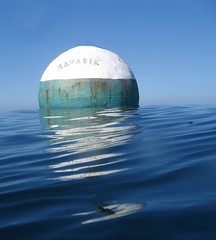 It's been fascinating, if frustrating, to watch from the sidelines as the company I work for, Navarik, has done some amazing stuff over the past year. Most recently, they launched a new version of Navarik Inspection, our web-based application that helps petroleum companies keep a handle on the oil they're moving around the world.
It's been fascinating, if frustrating, to watch from the sidelines as the company I work for, Navarik, has done some amazing stuff over the past year. Most recently, they launched a new version of Navarik Inspection, our web-based application that helps petroleum companies keep a handle on the oil they're moving around the world.That sounds like a pretty big deal for a small Vancouver company. It is. When people ask me what Navarik does, I use part of Navarik Inspection as an example. Here are the basics:
- When an oil tanker pulls up to a terminal to load, the company shipping the oil wants to know, (a) how much oil gets pumped in, and (b) what the qualities of that oil are.
- To confirm that, they hire a third-party cargo inspector who works near that terminal to check the various pumping measurements, and to take samples of the oil and analyze its properties, such as sulphur content, etc.—as well as to assess the state of the ship's tank, including (for instance) how much accumulated sludge is at the bottom.
- Another inspector performs similar measurements and analyses several weeks later at the discharge port, where the oil is unloaded.
- The information reported by the inspectors goes back not only to the shipper of the oil, but also potentially to a whole mess of other companies and people, often including the terminals, the ship's crew, the ship owner and operating company (which can be different), both the buyer and seller of the oil, various others involved in the transaction, and possibly government and regulatory agencies as well.
- Each company receiving that information might do a bunch of stuff with it, such as passing it among various departments and through a bunch of computer systems for accounting, payment, analysis, and so on.
- Especially with oil at record high prices, having that quantity and quality information be accurate is pretty important.
- Until rather recently, a lot of the inspection reporting involved somewhat ad hoc systems of fax transmissions, emails, phone calls, courier shipments, and typing of the same information several times over into different computers at different places by different people—which risks delays and errors.
There's a lot more to it than that, obviously—mechanisms for other people to put together the lists of tests to be performed, procedures for nominating and contacting inspectors, information about ports and terminals around the world, thresholds for alerting people when inspection results are out of spec, and so on—but the overall result is that the whole cargo inspection process can go more smoothly. Information moves more efficiently and is more accurate, and people get paid quicker. And we have other web software solving similar problems for other companies too.
What I'm talking about here is a real web business—not one with a high profile and a shiny 3D glistening logo and a gazillion page views for a beta application with a questionable revenue model. Instead, Navarik is an under-the-radar company turning eight this year, with a few dozen very talented employees in a nondescript light industrial Vancouver building, adding a little bit of extra efficiency to the energy industry that keeps the modern world functioning.
For a business, that's a pretty good place to be. Navarik's founder, my friend Bill Dobie, will be speaking at the eLiberatica open-source conference in Romania this spring about it, and about how we use open technologies and standards that were built over the past decade for the Internet to make it happen.
I'm also hoping to be well enough again sometime later this year to help move it all along.
10 March 2008
Vancouver podcaster meetup Wed Mar 12
 There's going to be a podcaster meetup this Wednesday, March 12, 2008. Details:
There's going to be a podcaster meetup this Wednesday, March 12, 2008. Details:6:30 p.m.
The End Cafe
2360 Commercial Drive (just north of the SkyTrain)
Vancouver, British Columbia
Alas, I won't be there—I have yet more chemo that day, so that night I'll be in sad shape, curled up in bed watching The Food Network, or sleeping. But my co-host Paul plans to be there, and I'm hoping some of the rest of you will too—if you're not at SXSW in Austin, of course.
You don't need to be a podcaster or blogger or whatever. If meeting other webby types is up your alley, head on down. Doing a little RSVP at upcoming.org or Facebook would help with planning, I guess, but you should also just be able to show up.
Have a drink or two for me, will you?
09 March 2008
What does a film about gays and religion mean to me?
At the video store yesterday my wife suggested we pick up For the Bible Tells Me So, a documentary about Christian families whose children come out as gay. Despite a slightly silly and jarring animated interlude, it's a good film.
It would be especially worthwhile for people in similar situations: those parents, relatives, and friends who have been brought up to think of gays and lesbians as "abominations" (in the words of an oft-cited Bible passage) but who want to maintain their religion and also accept a loved one's homosexuality. Or for those raised conservatively Christian who are gay themselves, and struggle with it.
But I'm neither gay nor religious. I'm an atheist, and my many friends who are gay, lesbian, or transgendered don't offend my sensibilities in any way. For me, the movie is more of an anthropological study, and a fascinating one because a religious life is so far from my own experience.
It makes sense to me that those who work to reconcile the Bible (or the Qu'ran, or otherreligious books) with many aspects of modern life often have tough work to do. Those books were written centuries or millennia ago, by people who knew nothing of gravitational theory, fossils, deep time, microbiology and germs, Big Bang cosmology, evolution, quantum mechanics and relativity, plate tectonics, organic and inorganic chemistry, absolute zero, the concept of a vacuum, and DNA—or even of the existence of the Americas, Australia, Antarctica, and the Pacific Ocean.
So if authorities at the time thought that homosexuality was unclean or improper or abominable, of course they wrote that into their religious texts. Accordingly, that same passage of the Bible also condemns wearing clothes of mixed fibres, cutting your hair a certain way, and eating shellfish and pork as equally wrong. Plus, other passages of those same books condone or accept slavery, physical abuse of women, pillaging and murder during wartime, and other things many of us now consider abominable.
And indeed, still other parts say you should sell all you have and give the proceeds to the poor, not squander your wealth wastefully, go forth and multiply, not be arrogant and boastful, forgive debts, and love your neighbour. Oh, and you shall not work on the Sabbath, shall honour your parents, shall not kill or commit adultery or bear false witness, etc.
You can consider those proclamations the words of men now long dead—words sometimes wise and transcendent, sometimes narrow-minded and obsolete. Or you can consider them the word of God. Then you might have to interpret what those words could mean in a time where we have stood on the Moon, created antibiotics, invented the Internet, changed the climate, developed sexual reassignment surgery, measured the age of the Universe, and reached a population exceeding six billion.
I find those interpretations interesting. But unlike the subjects of the film, including well-known gay Episcopal Bishop Gene Robinson, for me they are unnecessary. I have no personal need to reconcile modern ethics and morals with the Bible or the Qu'ran or the Vedas; with the teachings of Buddha or Lao Tzu or Confucius; or for that matter with the myths of the Spartans, Aztecs, Bantu, Haida, or Maori. Any or all of those things can inform my sense of right and wrong, but they don't define it.
All of us struggle to be good people. For the Bible Tells Me So can help some of us in that struggle. It's worth watching, whether its struggle is yours or not.
It would be especially worthwhile for people in similar situations: those parents, relatives, and friends who have been brought up to think of gays and lesbians as "abominations" (in the words of an oft-cited Bible passage) but who want to maintain their religion and also accept a loved one's homosexuality. Or for those raised conservatively Christian who are gay themselves, and struggle with it.
But I'm neither gay nor religious. I'm an atheist, and my many friends who are gay, lesbian, or transgendered don't offend my sensibilities in any way. For me, the movie is more of an anthropological study, and a fascinating one because a religious life is so far from my own experience.
It makes sense to me that those who work to reconcile the Bible (or the Qu'ran, or otherreligious books) with many aspects of modern life often have tough work to do. Those books were written centuries or millennia ago, by people who knew nothing of gravitational theory, fossils, deep time, microbiology and germs, Big Bang cosmology, evolution, quantum mechanics and relativity, plate tectonics, organic and inorganic chemistry, absolute zero, the concept of a vacuum, and DNA—or even of the existence of the Americas, Australia, Antarctica, and the Pacific Ocean.
So if authorities at the time thought that homosexuality was unclean or improper or abominable, of course they wrote that into their religious texts. Accordingly, that same passage of the Bible also condemns wearing clothes of mixed fibres, cutting your hair a certain way, and eating shellfish and pork as equally wrong. Plus, other passages of those same books condone or accept slavery, physical abuse of women, pillaging and murder during wartime, and other things many of us now consider abominable.
And indeed, still other parts say you should sell all you have and give the proceeds to the poor, not squander your wealth wastefully, go forth and multiply, not be arrogant and boastful, forgive debts, and love your neighbour. Oh, and you shall not work on the Sabbath, shall honour your parents, shall not kill or commit adultery or bear false witness, etc.
You can consider those proclamations the words of men now long dead—words sometimes wise and transcendent, sometimes narrow-minded and obsolete. Or you can consider them the word of God. Then you might have to interpret what those words could mean in a time where we have stood on the Moon, created antibiotics, invented the Internet, changed the climate, developed sexual reassignment surgery, measured the age of the Universe, and reached a population exceeding six billion.
I find those interpretations interesting. But unlike the subjects of the film, including well-known gay Episcopal Bishop Gene Robinson, for me they are unnecessary. I have no personal need to reconcile modern ethics and morals with the Bible or the Qu'ran or the Vedas; with the teachings of Buddha or Lao Tzu or Confucius; or for that matter with the myths of the Spartans, Aztecs, Bantu, Haida, or Maori. Any or all of those things can inform my sense of right and wrong, but they don't define it.
All of us struggle to be good people. For the Bible Tells Me So can help some of us in that struggle. It's worth watching, whether its struggle is yours or not.
Links of interest (2008-03-09):
- "You call this traveling? Twenty-one days, 15 countries, 45,000 miles—without setting foot outdoors."
- "The more affluent a country gets, the more things parents come to see as essential for raising children [so] as long as the world keeps creeping out of poverty, families will continue to shrink."
- jamNOW lets you jam online with other musicians, interact with fans, and listen to live streams from nightclubs all over the place. Haven't tried it, so I'm not sure how well it works.
- Looks like the iMac DV in our kitchen is finally officially obsolete. It's slow, but it still works pretty well.
- Are things really this bad for biology teachers in significant portions of the U.S.A.?
- "If all you do is work, your value judgements are unlikely to be sound."
- "I rejoice in this life that I have, and in the grandeur of a world that preceded me, and an earth that will abide without me."
- "Studies have shown that abstinence-only education does virtually nothing to prevent kids from having sex [and that] abstinence-only group[s] used birth control less frequently."
- "When I get a resume, the first thing I do is type the person's name into Google. If nothing comes up, I trash the resume without reading it."
- "I don't want my ISP looking at how I use the Internet to target ads to me, period, any more than I want the phone company listening in on my conversations in order to sell me stuff."
- TripIt looks like one of the best online travel resources out there, though I haven't tried it.
- How to make your website or blog faster.
- The Universe is 13.73 billion years old, give or take only about 120 million years. Now that is a cool finding.
Labels: apple, astronomy, evolution, family, google, linksofinterest, music, school, science, sex, space, travel, web
07 March 2008
Vavoom
I'm not sure if she's noticed, but after more than 12 years of marriage, and despite chemotherapy's deleterious effects on my vim and vigor, I still quite regularly check my wife out. Wink wink.
06 March 2008
It is a puzzlement
For a nerd, I'm surprisingly uninterested in puzzles and games. I have rarely played cards, was never into Dungeons and Dragons (didn't even read Tolkien, for that matter), don't generally do crosswords or Sudoku, get little enjoyment from jigsaw puzzles, don't enjoy chess, and never went in for those mind-bender style mathematical games from Martin Gardner and Douglas Hofstadter in my dad's Scientific American magazines. My wife taught me my first poker skills just a couple of weeks ago.
Yes, I own some M.C. Escher prints, and I was part of a regular weekly Mah-jongg game (not for money) for several years. My brain does tend to hew to stereotypically geeky pursuits. I have a science degree. I used to read a lot of science fiction, am fascinated by gadgets, have always preferred non-fiction to fiction in my reading otherwise, loved Star Wars and 2001 and Alien, was a young computer nerd (duh), and so on.
I understand why people like games and puzzles; I'm just not one of them. (Similarly, I understand the appeal of practical jokes, but personally dislike most varieties and rarely find them funny.)
But I like solving problems, if they're real ones. Getting all the gear from my band to fit just so into the car, tweaking web page code so it validates, editing audio transitions in a podcast, making a poster, taking effective photographs, or editing some writing—these are things I enjoy. They are puzzles and games too, but the kind that exist to accomplish something, not for their own sake. Maybe related, I discovered early on that I'm not really suited to computer programming, even though that is problem-solving that is practical.
I'm not sure what all that says about me, or whether that question is a puzzle worth solving. It's interesting, though.
Yes, I own some M.C. Escher prints, and I was part of a regular weekly Mah-jongg game (not for money) for several years. My brain does tend to hew to stereotypically geeky pursuits. I have a science degree. I used to read a lot of science fiction, am fascinated by gadgets, have always preferred non-fiction to fiction in my reading otherwise, loved Star Wars and 2001 and Alien, was a young computer nerd (duh), and so on.
I understand why people like games and puzzles; I'm just not one of them. (Similarly, I understand the appeal of practical jokes, but personally dislike most varieties and rarely find them funny.)
But I like solving problems, if they're real ones. Getting all the gear from my band to fit just so into the car, tweaking web page code so it validates, editing audio transitions in a podcast, making a poster, taking effective photographs, or editing some writing—these are things I enjoy. They are puzzles and games too, but the kind that exist to accomplish something, not for their own sake. Maybe related, I discovered early on that I'm not really suited to computer programming, even though that is problem-solving that is practical.
I'm not sure what all that says about me, or whether that question is a puzzle worth solving. It's interesting, though.
05 March 2008
VFS students made a video of my tsunami blog posts
 Back in late 2004 and early 2005, following the Indian Ocean earthquake and tsunami, I wrote a series of blog posts that turned into a popular online articleabout tsunamis.
Back in late 2004 and early 2005, following the Indian Ocean earthquake and tsunami, I wrote a series of blog posts that turned into a popular online articleabout tsunamis.Now a two-minute video based on it, created by three local film school students, is available in iPod-compatible format for iTunes or QuickTime—as well as on my podcast.
Click the preview below to play it, or the direct link to see it bigger (that big one is a 25 MB MPEG file, so it may take awhile to load):
My friend Sebastien, who is Head of Digital Design at Vancouver Film School, referred me to the three students (Jamie Peterson, Erica Edwards, and Shalinder Matharu), who needed a topic for an infographic project. My contribution was limited to a couple of basic scripts; they did the rest, adapting the article into the instructional video graphic using Adobe Illustrator, Photoshop, and After Effects (no, those are not real paper cutouts—I asked).
Obviously, they had to cut down the concepts a huge amount to fit into the short time available, but I think the result is effective. It's difficult to keep scientific accuracy in such an abbreviated format, but I believe any quibbles a real wave researcher might have (such as with the shape of the wave) are pretty minor. Nice job, Jamie, Erica, and Shal.
04 March 2008
Braveblogging
Many months ago I said, about my cancer treatment, that I'm not brave, even though people say it. Bravery is facing danger head-on when you have other choices. Here have been my choices over the past year and a bit:
That's a pretty easy decision.
My real choices have been pretty small, and the choice to blog (and appear on the radio) about all this stuff was also an easy one, because this was the question: Write about my cancer like I write about everything else, and keep the information flowing? Or live two lives, and try to remember whom I've told and whom I should be hiding stuff from every single damn day?
Why would I choose to keep it private? Given who I am, how could I possibly do that and stay focused?
I said in that radio interview and elsewhere that, as far as relating to other people goes, cancer is an easy disease. People don't judge me for it. (Perhaps if it wasn't colorectal cancer, but lung cancer from smoking or liver cancer from drinking, some people might judge me. But even so, cancer is no longer "the C word.") They're sympathetic, and cut me a lot of slack.
What takes some bravery is what fellow Vancouver blogger Corinna is doing at her site Gus Greeper: writing in painful, wrenching detail about her depression, anxiety, and therapy. And her trip to the hospital yesterday after she downed a handful of pills and some wine.
Depression and other mental illnesses still have a big stigma. They shouldn't. For someone who has never experienced them, like me, they are tremendously difficult to understand, but that doesn't make them less real. And let me tell you, until you've been close to or had cancer yourself, you don't understand it either.
Stay brave, Corinna. It's worth the fight.
- Potentially life-saving small surgery? Yes or no?
- Potentially life-saving two-month radiation treatment? Yes or no?
- Potentially life-saving early two-month chemotherapy? Yes or no?
- Potentially life-saving large surgery? Yes or no?
- Potentially life-saving late six-month chemotherapy? Yes or no?
That's a pretty easy decision.
My real choices have been pretty small, and the choice to blog (and appear on the radio) about all this stuff was also an easy one, because this was the question: Write about my cancer like I write about everything else, and keep the information flowing? Or live two lives, and try to remember whom I've told and whom I should be hiding stuff from every single damn day?
Why would I choose to keep it private? Given who I am, how could I possibly do that and stay focused?
I said in that radio interview and elsewhere that, as far as relating to other people goes, cancer is an easy disease. People don't judge me for it. (Perhaps if it wasn't colorectal cancer, but lung cancer from smoking or liver cancer from drinking, some people might judge me. But even so, cancer is no longer "the C word.") They're sympathetic, and cut me a lot of slack.
What takes some bravery is what fellow Vancouver blogger Corinna is doing at her site Gus Greeper: writing in painful, wrenching detail about her depression, anxiety, and therapy. And her trip to the hospital yesterday after she downed a handful of pills and some wine.
Depression and other mental illnesses still have a big stigma. They shouldn't. For someone who has never experienced them, like me, they are tremendously difficult to understand, but that doesn't make them less real. And let me tell you, until you've been close to or had cancer yourself, you don't understand it either.
Stay brave, Corinna. It's worth the fight.
03 March 2008
Good CT scan results
Of course I would prefer if the small metastatic tumours in my lungs were gone or shrinking significantly. But they are stable, so this is still an encouraging report from my oncologist today:
Onward. Damn right.
Looks great, the pulmonary embolus [blood clot in the lung] has resolved! The [cancerous] spots in the lung are the same size... all good, cheers!"Looks great" and "all good" are nice words from a cancer doctor, and it's very pleasant to be rid of the blood clot.
Onward. Damn right.
Drums with Derek
 Despite the crap of the past week, I managed to get some of my hobby stuff done anyway, including a new episode of the Inside Home Recording podcast (in which you can hear me play electronic drums) and a couple of appearances on Leo Laporte's Lab With LeoTV show.
Despite the crap of the past week, I managed to get some of my hobby stuff done anyway, including a new episode of the Inside Home Recording podcast (in which you can hear me play electronic drums) and a couple of appearances on Leo Laporte's Lab With LeoTV show.Unfortunately, it will be a few weeks before The Labepisodes go to air, and more time after that before they're available online. I'll keep you posted.
Thanks to the Holloways for loaning me the use of the swanky electronic drums on both shows, by the way.
02 March 2008
Shitbagged
 Beware: graphic blog post ahead.
Beware: graphic blog post ahead.Chemotherapy isn't something your body gets used to—the side-effect symptoms generally just get worse and worse as you proceed with treatment. While I've had it better than some folks since my current round began in October, this week—and today in particular—has sucked.
I finished my usual chemo dosage on Friday, but my recovery, usually pretty quick, was slower then normal this week. I had my delayed CT scan Friday evening, then went out for dinner, but yesterday, Saturday, I felt hung over all day, with a dull headache and fatigue.
This morning was a disaster. One of the potential side effects of some of the chemo drugs is late-onset diarrhea, something I haven't had in the four months I've been on this treatment. But I got it last night. Because I've had a temporary ileostomy bag since the summer, I don't have the urge to go to the bathroom. The bag glued to the side of my belly simply fills up, and I have to notice and then head to the washroom to empty it. I did that around 1:30 a.m.
But if things go badly, as they did today, the bag leaks. I noticed around 7 a.m. when it filled up again. I was able to leap out of bed, charged with adrenaline, and avoid making a big mess. After cleaning things off I got into the shower and prepared to put on a new bag, but while washing my hair and shaving, I suddenly felt like I was going to pass out.
Normally for me that would be a sign of diabetic low blood glucose, but after spilling test strips across the kitchen counter, I checked my levels and they were normal. Something else was wrong, and I felt cold fear. I stumbled into the bedroom, still dripping from the shower, and woke my wife as I lay down to keep from falling over. Getting horizontal, I immediately felt a bit better.
After assessing the situation and talking to doctors at the Cancer Agency, she discovered that fluid loss probably made me dehydrated and light-headed. Electrolyte imbalances likely gave me the hangover-like symptoms too. I've been drinking fluids and taking Imodium, as well as sleeping, all day since. I feel mostly normal now, but the headache is still there. My wife is having a nap too, because she was out late last night and didn't get enough sleep before I zombie-crashed her awake first thing today.
I hate having to put her and the kids through crap like this. It scares me too. I hope tomorrow is better.

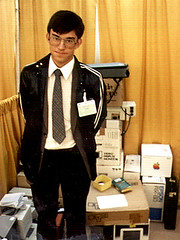

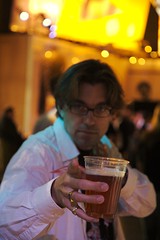
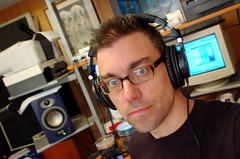


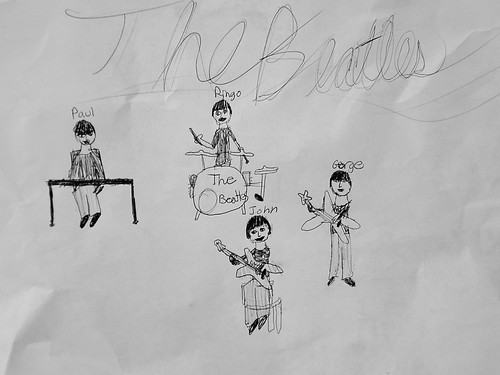
No comments:
Post a Comment